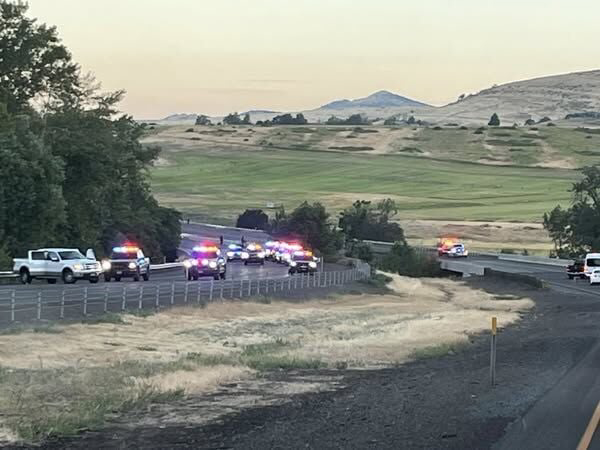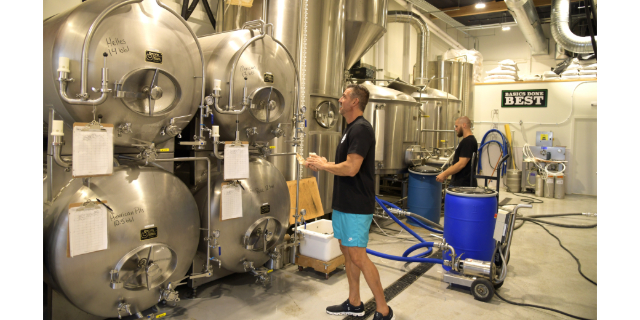Buying vineyards: Southern Oregon still a bargain, for now
Published 6:00 am Monday, August 21, 2023

- Alan DeVries, a Southern Oregon real estate broker, says some retiring farmers downsize to vineyards.
A vineyard’s multimillion-dollar price tag might seem like a lot of money, but it’s a surprisingly good deal for some, said Alan DeVries, a Southern Oregon broker for Cascade Hasson Southeby’s International Realty.
Trending
“There’s a huge influx from neighboring states coming to the Rogue Valley,” he said. Some of those are drawn to the 247-acre property with 100 acres planted to winegrapes, because the price was a bargain compared to similar estates in the Napa Valley, at nearly half the price per acre, DeVries said.
The vineyard came on the market when the owner died in February, he said.
You don’t have to be a millionaire to invest in wineries, but doing your homework is a must.
Trending
DeVries, who specializes in vineyard and winery real estate sales, has some tips on how to invest in Oregon vineyards and wineries, while it’s still affordable.
His first tip is for farmers who are retiring or downsizing: Don’t delay the dream to own a winery, he suggested. One of his buyers has spent his life growing row crops, alfalfa and tomatoes and now wants to spend it among vines.
Another is an almond grower, looking to scale down to a small winery.
“This is a great investment for retirement farmers who want to continue to tinker. It still keeps your blood flowing every day,” DeVries said. “Some have dreamed of this their whole lives.”
The comparatively lower prices per acre is not the only reason buyers are looking at southern Oregon property. The area’s 70 varietals, and a longer growing season with less rainfall and fewer mold and mildew issues than Willamette Valley’s wine country, make its grapes popular additions to any company’s offerings.
Almost all of Oregon’s larger wineries, no matter where they are, feature one or more wines made from Southern Oregon’s grapes.
Southern Oregon wineries and vineyards have their challenges, not the least of which is smoke and fire danger, or the perception of it, the availability of water, and isolation. Those challenges make it important to purchase from a broker who knows about vineyard and winery management, DeVries said.
A would-be buyer needs to understand area zoning and building requirements, water and irrigation rights, the history and health of the vineyard, area management services, soil properties, weather patterns, and the fair price for the property.
“Get with someone who knows the ins and outs of the area,” he said.
In the 10 years since DeVries, 47, sold his first winery, southern Oregon winegrape production has tripled according to the Southern Oregon Winery Association. DeVries can attest to the resulting bump in values.
The $2.5 million value of that first property he sold — 300 acres with Applegate riverfront and 40 acres in winegrapes — has doubled.
Still, the price for vineyard land in Oregon – from $25,000 to $50,000 per acre depending on development — is “peanuts” compared to California, where prices are double or more, DeVries said.
Despite the bargains, Southern Oregon winery buyers have to consider challenges when they consider purchases, including marketing and distribution.
For example, Oregon’s vineyards tend to be farther from population centers, which presents marketing and distribution challenges. Smart buyers will purchase vineyard property close to other established vineyards and wineries, DeVries suggested.
“Consider where you are on the wine trail,” he said.
DeVries also suggests grapes are best sold “by the glass.”
The most profitable vineyard owners also make their own wines, he said.
There are now more than 1,000 wineries and 40,000 acres of vineyards in Oregon with more coming online each year, according to Oregon Wine Board statistics. Despite national trends that indicate flagging wine sales, Oregon sales are increasing.
It’s hard work, it takes patience, but investing in Oregon vineyard and wineries is a safe bet if you do your homework, says the broker.
“It’s a wise place to put money,” he said. “It’s a commodity, and there are risks, but Oregon is doing very well.”









